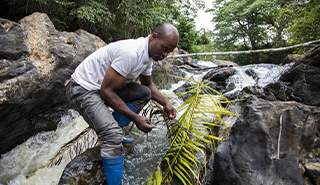University of Reading to Investigate Impact of Climate Change on Tropical Diseases
The Walker Institute has teamed up with Sightsavers to explore how climate change will affect the spread of neglected tropical diseases (NTDs).
NTDs are a diverse group of conditions, such as dengue, leprosy and river blindness, caused by a variety of pathogens including viruses, bacteria, parasites, fungi and toxins. More than a billion people are affected by NTDs around the world, and there is evidence that a global rise in temperatures, coupled with changing weather patterns, could alter how these diseases are spread.
The Walker Institute, based at the University of Reading, supports the development of climate-resilient societies. It uses research to help solve issues faced by low-income countries, such as migration, food and water security, risks to livelihoods, and biodiversity loss. Sightsavers is an international non-profit organization that works to prevent avoidable blindness, combat NTDs, and promote the rights of people with disabilities.
The partners’ new research study will focus on Malawi, where people are currently at risk from a number of neglected tropical diseases.
During the study, researchers will engage with local communities and academics to explore different climate change scenarios and the implications these will have for factors affecting disease, such as changing rainfall patterns, the displacement of people and animals, and changes to NTD-spreading insect populations. The study aims to provide a way to predict the areas in Malawi that will be worst affected by NTDs as the climate changes.
Ultimately, the researchers also want to work with governments in other NTD-affected countries, combining climate and health data in order to support better decision-making. They are looking for additional technical and funding partners to support the initiative.
Walker Institute director Professor Rosalind Cornforth said: “This partnership with Sightsavers will improve our understanding of the links between various NTDs and climate, with regards to population displacement, human infection and entomological changes.
“NTDs disproportionately affect some of the most vulnerable people in the world and this is likely to be exacerbated by the climate emergency. We aim to improve regional and local climate change modelling to enable more reliable predictions of health impacts and allow better planning and decision-making for the people who are at most risk.”
Sightsavers technical director for NTDs Philip Downs said: “To treat, prevent and ultimately eliminate these diseases, we need different sectors to come together and play their part.
“By working with governments and the Walker Institute, we hope we can better understand how climate influences the spread of disease. This means that the communities who are affected by these diseases will be better prepared to mitigate the risks and continue to work towards NTD elimination.”

